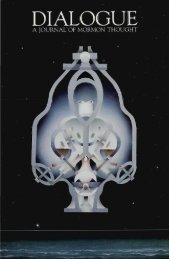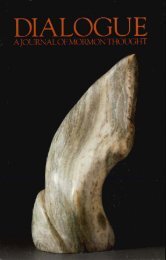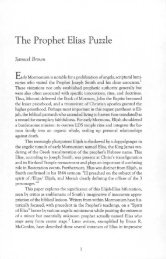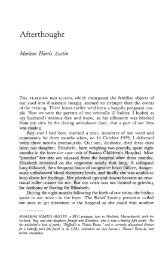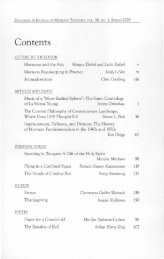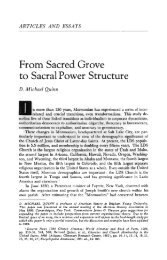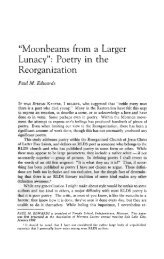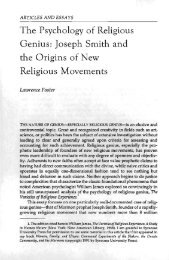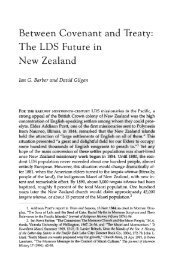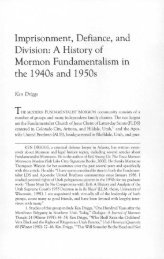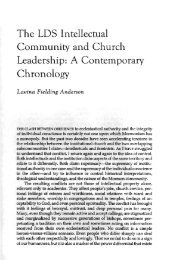Dialogue, Volume 25, Number 2 - Dialogue – A Journal of Mormon ...
Dialogue, Volume 25, Number 2 - Dialogue – A Journal of Mormon ...
Dialogue, Volume 25, Number 2 - Dialogue – A Journal of Mormon ...
You also want an ePaper? Increase the reach of your titles
YUMPU automatically turns print PDFs into web optimized ePapers that Google loves.
Anderson: The Primary 93<br />
with the rest <strong>of</strong> the Church this year, I find that I identify with the<br />
disciples. I am impressed at how <strong>of</strong>ten we hear <strong>of</strong> the disciples being<br />
chastised. "Do ye not yet understand?" and "Oh ye <strong>of</strong> little faith" are<br />
fairly common refrains in Christ's remarks to them. Once he chastises<br />
Peter, "Get thee behind me, Satan: thou art an <strong>of</strong>fence unto me: for<br />
thou savourest not the things that be <strong>of</strong> God, but those that be <strong>of</strong> men"<br />
(Matt. 16:23). That is a rather stiff rebuke. No "Let me see, how do I<br />
put this tactfully" Junior League training evident here. I am grateful<br />
that the keepers <strong>of</strong> the oral tradition did not try to promote an image<br />
<strong>of</strong> Christ's disciples as having been perfect in their understanding nor<br />
gloss over or omit their errors from the history, letting the Pharisees<br />
and Sadducees be the only ones to take the flack. Just as the disciples<br />
were easily distracted from what is really important, I as a Primary<br />
president was easily distracted from the real stuff <strong>of</strong> Primary.<br />
The disciples seemed to think that Christ was there to set up a new<br />
kingdom on earth right away. Like the early <strong>Mormon</strong> Saints, many<br />
believed the Second Coming and the millennial order were imminent.<br />
Thus James and John were not thinking <strong>of</strong> the afterlife when they<br />
requested to sit on his right and left hand when Christ came in glory.<br />
They wanted to secure a position <strong>of</strong> importance in the new hierarchy.<br />
(In Matthew 20:20 the account has their mother urging them forward<br />
and asking the question in their behalf. She is omitted as the instigator<br />
from the Mark 10:37 account.) Christ first says to them, rather ironically<br />
I think, that they shall indeed drink from the same cup as he. He<br />
doesn't mention it is a bitter cup. He then points out that such positions<br />
<strong>of</strong> power are not his, but his Father's, to give anyway (Matt. 20:24).<br />
The real issue is that they have misunderstood again. He tries to<br />
explain the distinction between the kind <strong>of</strong> power they are anticipating<br />
(the hierarchical or formal power <strong>of</strong> institutions where power resides<br />
in <strong>of</strong>fices and where people have authority over one another by virtue<br />
<strong>of</strong> those <strong>of</strong>fices) and the power <strong>of</strong> God, which is not the power to exert<br />
one's will over another but to bless others through gentleness, meekness,<br />
love unfeigned (D&C 121:41).<br />
Christ said to James and John, "Ye know that the princes <strong>of</strong> the<br />
Gentiles exercise dominion over them, and they that are great exercise<br />
authority upon them." Exercising authority upon them: exercising<br />
authority over people and upon them is power as the world understands<br />
it. "But it shall not be so among you," Christ goes on to explain to<br />
them, "but whosoever will be great among you, let him be your minister.<br />
And whosoever will be chief among you, let him be your servant"<br />
(Mark 10:42-43).<br />
The need for order and for a hierarchy in administrative matters<br />
clouds our understanding <strong>of</strong> this message that Christ kept repeating.



